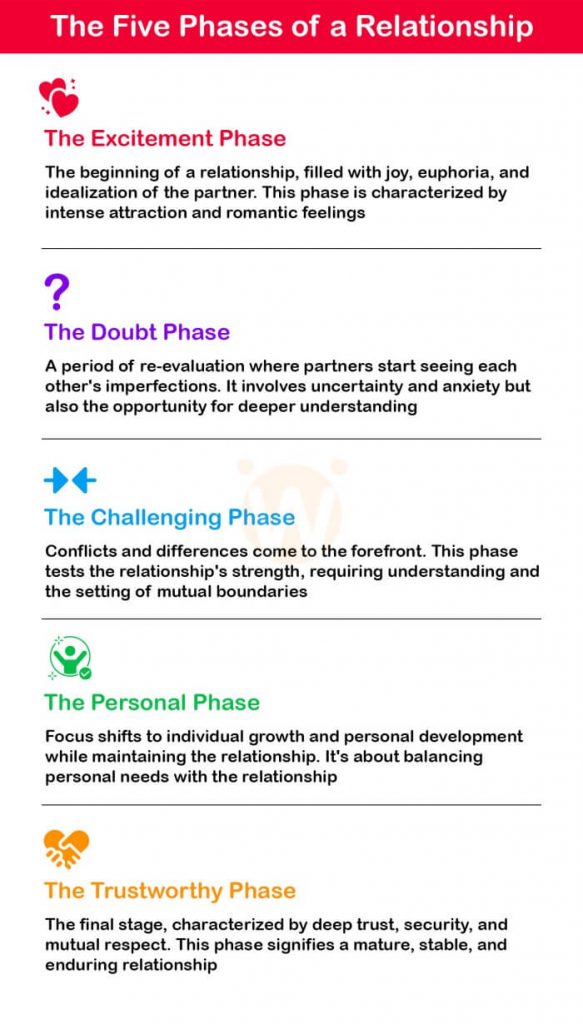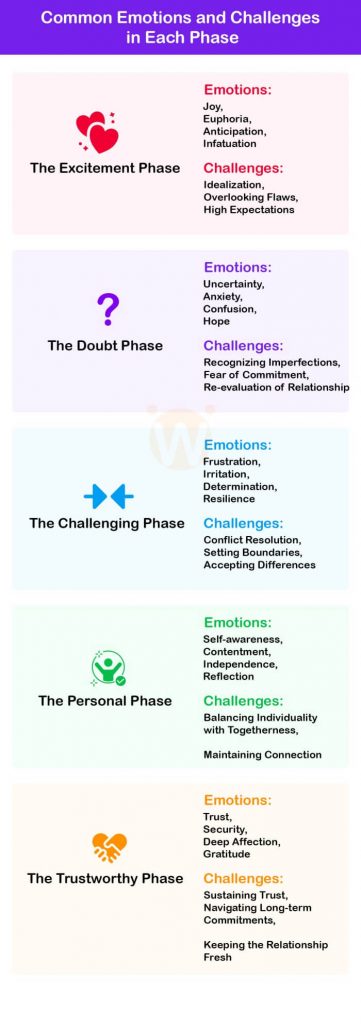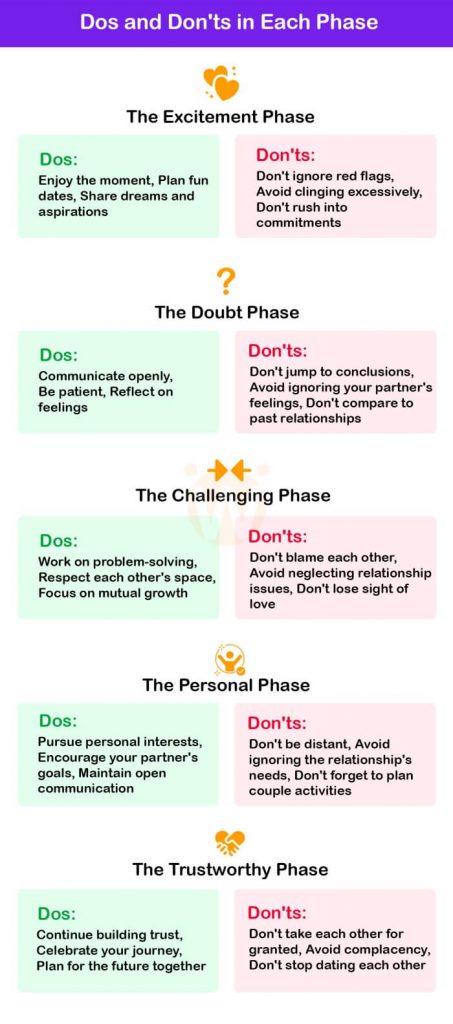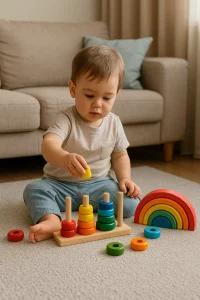The 5 Phases of a Relationship every couple goes through
By Prapoorna M
Last Updated: December 15, 2022
Embarking on a romantic journey can be as thrilling as it is complex , similar to understanding the effect of love and compassion in our life.. In this article, we unravel the intricate tapestry of couple relationships by exploring the five critical phases every couple experiences. From the initial flutter of excitement to the deep-rooted trust that defines long-term partnerships, understanding these stages is vital. Not only does it offer a roadmap to navigate the ebbs and flows of a relationship, but it also provides invaluable insights into the dynamics of love, compromise, and growth. Whether you’re in the bliss of new love or navigating the challenges of a long-term commitment, this guide will help you understand the natural progression of your relationship and how to nurture it at every step.
Book Relationship Counselling Now

The Excitement Phase: The Dawn of Romance
In the beginning stages of a relationship, couples often find themselves in the ‘Excitement Phase’, a period marked by intense attraction and an overwhelming sense of euphoria. This is the time when everything about your partner seems enchanting and perfect.
Rose-Tinted Glasses and Heartfelt Euphoria
During this initial phase, love seems to be in the air, and the world appears brighter. Partners view each other through rose-tinted glasses, focusing solely on the positives and often overlooking any flaws. The mere thought of your partner can set your heart racing and fill you with a joyful anticipation. This phase is driven by powerful hormones like serotonin and dopamine, which heighten feelings of happiness and reward.
Savoring the Moments of New Love
As you find yourself more prone to daydreaming, cherish these moments of new love. This phase is characterized by its flirty sensations, the flutter of ‘butterflies in your stomach’, and a general sense of exhilaration. This euphoric stage is a time to enjoy the thrill of new intimacy and the excitement that comes with discovering each other.

Embracing the Temporary Nature
It’s important to remember that this phase, as intense as it is, is temporary. Typically lasting anywhere from 3 to 18 months, the excitement phase will gradually evolve. The rose-tinted glasses will eventually fade, and the once-overwhelming butterflies will settle. However, this transition is not a loss but a natural progression towards building a deeper, more rooted connection in your relationship.
Conclusion: A Foundation for Deeper Connection
While it may seem bittersweet that this phase will eventually transition into something less exhilarating, it sets the foundation for the next stage of your relationship. As the excitement cools, it gives way to a deeper understanding and appreciation of each other, laying the groundwork for a more enduring and profound bond.
By understanding and embracing each stage of your relationship, you can navigate the journey of love with greater insight and appreciation. Enjoy the excitement phase for its beauty and excitement, but also look forward to the depth and connection that the future stages will bring. This euphoric stage is akin to the thrill described in love or blind infatuation.
The Doubt Phase: Navigating the Realities of Partnership

Facing the Reality Beyond Excitement
As the initial excitement of a new relationship begins to settle, couples enter the ‘Doubt Phase’. This stage marks a significant shift from the idyllic beginnings to a more realistic understanding of each other. The once rose-tinted view fades, revealing the true personalities, complete with quirks, weaknesses, and fears.
Understanding and Accepting Imperfections
This phase is characterized by the realization that your partner, and your relationship as a whole, may not be as perfect as initially perceived. It’s a time when the peculiarities and flaws of both partners come to the forefront. This can be a challenging period, as it often involves a re-evaluation of your feelings and the future of the relationship.
Communication is Key
Open and honest communication becomes crucial during this phase. It’s important to discuss your feelings, concerns, and differences. This dialogue is vital for understanding each other better and for addressing any issues that arise. It’s through these conversations that you can determine if your love can grow and adapt to these newfound realities.
Dealing with Disillusionment
Disillusionment is a common aspect of the Doubt Phase. You might start to see aspects of your partner that don’t align with your idealized view of them. It’s a time when the fantasy of ‘perfect’ love is replaced with the understanding that love is complex and sometimes challenging.
Focusing on Individuality
During this phase, there’s often a shift back towards individuality. Partners may start to focus more on their own lives and interests, which can be healthy but also may create distance if not balanced with the relationship’s needs.
The Risk of Separation and the Opportunity for Growth
If differences and issues are not addressed effectively, this phase can lead to doubts about the future of the relationship, sometimes even leading to separation. However, it also presents an opportunity for growth and strengthening the bond if both partners are willing to work through the challenges.
Conclusion: Embracing the Doubt Phase
The Doubt Phase, while challenging, is a crucial part of a relationship’s evolution. It offers a chance to move past idealization and build a relationship based on real understanding and acceptance. By embracing this phase and working through it together, couples can lay the groundwork for a more resilient and fulfilling partnership. Remember, doubt does not signify the end; rather, it’s a call to deepen your connection and understanding of each other.
As you navigate this phase, consider reading about better ways to communicate in relationships to enhance understanding.
The Challenging Phase: Facing and Overcoming Relationship Hurdles

Entering the Arena of Real Challenges
After navigating the excitement and doubt phases, couples encounter the ‘Challenging Phase’. This stage can be a critical test of the relationship’s strength and resilience. It’s marked by the discovery of deeper differences and the realization that maintaining harmony requires more than just love.
Confronting Daily Realities and Differences
In this phase, you come face-to-face with your partner’s habits and daily routines, some of which might clash with your own. This stage highlights the fact that every individual has their unique mindset and idiosyncrasies. Such differences, previously unnoticed or overlooked, can now become sources of irritation and conflict.

Rising Tensions and Arguments
It’s common for conversations to escalate into arguments, with accusations like “You never listen” or “You’re always like this” becoming frequent. These conflicts often arise from the mistaken belief that our own values and habits should be universally accepted, including by our partner.
The Pitfalls of Trying to Change Your Partner
Many enter this phase with the optimistic notion that they can change or ‘educate’ their partner. However, this approach is usually futile and can even be harmful to the relationship. Acceptance, rather than change, should be the goal.
The Importance of Setting Boundaries
Clearly defined boundaries are essential for any relationship to thrive. This phase forces couples to confront this need and work together to establish a set of mutually agreed-upon rules and expectations.
Embracing Imperfections and Differences
A key to navigating this challenging phase is to accept each other’s imperfections and differences. This acceptance doesn’t mean ignoring problems but rather acknowledging them and working through them constructively.
The Reward of Perseverance
There’s a silver lining for those who successfully navigate this challenging phase. Couples who manage to understand and respect each other’s differences are often rewarded with a calmer, more stable relationship in the subsequent stages.
Conclusion: The Gateway to Deeper Understanding
The Challenging Phase, while demanding, serves as a gateway to a deeper, more mature relationship. It’s a time for both partners to learn, grow, and adjust to each other’s realities. Overcoming these challenges doesn’t just resolve immediate conflicts; it lays the groundwork for long-term harmony and mutual respect. Remember, enduring love is not just about surviving the challenges but also about growing stronger through them.
This phase can be as taxing as understanding and managing anger in adults.
The Personal Phase: Cultivating Individual Growth within the Relationship
Transitioning from ‘We’ to ‘I’
The ‘Personal Phase’ marks a significant shift in the relationship dynamics. After navigating the excitement, doubt, and challenges, the focus gradually shifts from the collective ‘we’ to the individual ‘I’. This phase is about recognizing and embracing the importance of personal development within the context of the relationship.
Emphasizing Personal Development and Peace
In this stage, there’s a growing need to focus on what makes each partner feel calmer and more at peace. This could involve pursuing individual hobbies, career goals, or personal interests. The idea is to find balance and fulfillment outside the relationship while still maintaining a healthy connection with your partner.
Exploring Individual Interests
You start to explore and invest more in your personal interests and activities. This exploration is not about drifting apart but about strengthening your individual selves. The healthier and more fulfilled each partner is individually, the stronger the relationship can become.
Reflecting on Personal Needs and Growth
Both partners are encouraged to reflect on their personal needs, aspirations, and areas for growth. This could include reassessing one’s career path, financial goals, hobbies, and even physical and emotional health. The aim is to give yourself a ‘rain check’ – a chance to pause and evaluate your personal journey and growth.
Balancing Individuality and Togetherness
The challenge in this phase is to maintain a healthy balance between individuality and the relationship. It’s about growing as individuals while not losing sight of the partnership and mutual support that defines your relationship.
Enhancing the Relationship through Self-Growth
Ironically, by focusing on individual growth, partners often bring more to their relationship. Personal development leads to self-fulfillment, which in turn can enhance the quality of the relationship. A partner who is content and growing is more likely to contribute positively to the relationship.

Conclusion: The Strength of Self-fulfillment in Relationships
The Personal Phase is a testament to the fact that for a relationship to thrive, each individual within it must also thrive. By focusing on personal development, partners can bring their best selves to the relationship, enriching it further. This phase isn’t about growing apart; it’s about growing individually so that together, the relationship becomes even stronger and more fulfilling.
The Trustworthy Phase: Celebrating a Deep and Secure Bond
Arriving at the Pinnacle of Relationship Growth
The ‘Trustworthy Phase’ represents the culmination of a relationship’s evolution. It’s a stage where couples can take pride in having navigated through the various challenges and complexities of their relationship. This final stage is characterized by deep trust, mutual respect, and a profound understanding of each other.
Cultivating a Relationship Based on Trust and Support
In this phase, the relationship transforms into one that is thoroughly trustworthy. Partners realize the extent to which they enrich and support each other’s lives. Having weathered both minor disagreements and major crises together, couples in this phase have a well-rounded understanding of each other, accepting each other’s imperfections that have now become integral bonds of their relationship.
Personal Growth Leading to Relationship Harmony
Following the Personal Phase, where individual growth was emphasized, partners now understand not only their own needs but also those of their partner. This mutual understanding allows for a relationship where both partners can enjoy freedom and trust. It’s a phase where the relationship is seen as a lifelong journey of companionship.
Living Together in Harmony
Couples in the Trustworthy Phase have mastered the art of living together in harmony while also maintaining their individuality. There’s a balanced interdependence where neither partner feels neglected nor overshadowed. This harmony is the result of years of learning, understanding, and growing together.
Realistic Expectations and Authenticity
One of the hallmarks of this phase is the absence of unrealistic expectations and pretenses. Couples no longer project unattainable ideals onto their partner. Instead, there’s a genuine acceptance and appreciation of each other as they are, leading to a more authentic and fulfilling relationship.
Conclusion: A Testament to Enduring Love and Partnership
Reaching the Trustworthy Phase is a testament to the enduring nature of your love and partnership. It signifies a relationship that isn’t just about surviving together but thriving together. This phase is where true contentment lies – in knowing that you have a partner with whom you can share life’s journey, with all its twists and turns, in a space of mutual trust, respect, and understanding. It’s a phase that truly epitomizes the saying, “together through thick and thin.”
The deep understanding achieved in this phase can be further explored in articles like rebuilding trust in relationships.
Comparison of Each Phase
| Phase | Duration | Key Challenges | Main Emotions | Advice for Couples |
|---|---|---|---|---|
| Excitement | 3 to 18 months | Idealization, Overlooking flaws | Joy, Euphoria | Enjoy the moment, be open to discovery |
| Doubt | Varies | Recognizing imperfections, Re-evaluation | Uncertainty, Anxiety | Communicate openly, be patient |
| Challenging | Varies | Conflicts over habits, Need for boundaries | Frustration, Irritation | Work on understanding, set clear boundaries |
| Personal | Varies | Balancing individuality with togetherness | Self-awareness, Contentment | Focus on personal growth, respect each other’s space |
| Trustworthy | Long-term, Ongoing | Maintaining trust and support | Trust, Security | Foster deep understanding, cherish the bond |
Conclusion
This article navigates the five phases of a romantic relationship, from the exhilarating Excitement Phase to the mature Trustworthy Phase, outlining the evolution of love from initial infatuation to deep, enduring trust. Understanding these phases helps couples appreciate the journey of their relationship, emphasizing the importance of communication, growth, and adaptability. Each stage presents unique challenges and opportunities for personal development and mutual understanding, crucial for fostering a healthy and fulfilling partnership.
A wellness hub is an essential resource in this journey, offering guidance and support to navigate the complexities of relationships. It aids in enhancing communication, promoting personal growth, and providing strategies to manage challenges, underscoring the significance of individual and collective wellness in building a strong, lasting bond. Engaging with a wellness hub empowers couples to thrive through each phase, enriching their relationship with insight and resilience.
As we’ve journeyed through these phases, remember that understanding and managing stress, as discussed in how to manage your stress, is also crucial in a relationship.
Typical triggers that lead to the transition from one phase to the next in a relationship
| From Phase | To Phase | Transition Trigger |
|---|---|---|
| Excitement | Doubt | Realization of partner’s imperfections; the end of the ‘honeymoon period’ |
| Doubt | Challenging | Daily life conflicts; facing realities of cohabitation and deeper commitment |
| Challenging | Personal | Need for personal space and growth; understanding the importance of individuality within the relationship |
| Personal | Trustworthy | Developing a deeper understanding and respect for each other; recognizing the strength and stability of the relationship |
Frequently Asked Questions:
1. What are the five phases of a relationship?
The five phases—Excitement, Doubt, Challenging, Personal, and Trustworthy—represent the evolution of a romantic relationship from the initial thrill and idealization to deep trust and mutual respect. These stages reflect the complexity and depth of romantic partnerships, emphasizing the importance of growth, understanding, and adaptation at every step.
2. How long does each relationship phase last?
The duration of each phase varies significantly among couples, influenced by personal experiences, relationship dynamics, and external factors. For example, the Excitement Phase can last from 3 to 18 months. However, the subsequent phases do not have a fixed duration and can be influenced by how couples navigate challenges and growth opportunities.
3. Is it normal to experience doubts in a relationship?
Yes, experiencing doubts is a normal and expected part of the relationship journey, especially in the Doubt Phase. This stage involves re-evaluating feelings and the future of the relationship as initial idealizations fade, making room for a more realistic view of each other and the partnership.
4. Can a relationship survive the Challenging Phase?
Definitely. Many relationships emerge stronger from the Challenging Phase. This stage tests the resilience and adaptability of the partnership, where couples face and work through differences and conflicts. Successfully navigating this phase often leads to a more stable and mature relationship.
5. What does the Personal Phase mean for a relationship?
The Personal Phase signifies a shift towards individual growth within the relationship. It emphasizes the importance of personal development and pursuing individual interests while maintaining a healthy connection. This phase underscores the balance between individuality and togetherness, fostering a stronger, more enriched partnership.
6. How do you know if your relationship has reached the Trustworthy Phase?
A relationship has reached the Trustworthy Phase when it’s characterized by deep trust, mutual respect, and a profound understanding of each other. This phase is marked by stability, contentment, and the ability to navigate life’s challenges together, reflecting a mature and enduring partnership.
7. Is it possible to skip a phase in a relationship?
While it’s possible for some phases to be shorter or less pronounced, each phase contributes to the development of a healthy, long-term relationship. Skipping a phase entirely might mean missing out on critical growth opportunities and understandings that strengthen the partnership.
8. Can a relationship go back to a previous phase?
Yes, relationships are dynamic and can revisit earlier phases, especially during times of significant change or stress. This fluidity is part of the natural progression and adaptation process within a relationship.
9. How can couples navigate through each phase successfully?
Successful navigation through each phase involves open communication, mutual respect, a willingness to compromise, and a commitment to both personal and joint growth. Understanding the unique challenges and opportunities of each phase can help couples adapt and support each other more effectively.
10. What should you do if you’re struggling in a particular phase?
If you’re struggling in a phase, seeking counseling or therapy can offer significant support. It’s crucial to address concerns openly and work together to find solutions, leveraging professional guidance to navigate challenges and strengthen the relationship.
A realization that every relationship includes similarities and differences has now prevailed, and hence the conflicts are resolved more constructively than before. As you understand the reality of relationships, you are ready for a life-long relationship that has a high chance of a “lived happily ever after.”
About the Author:
Prapoorna Mangalampalli
M.Sc., M.A., (Dual Masters in Psychology & English) – Counselor (6+ years of experience)
Prapoorna armed with a passionate dedication fueled by dual Master’s degrees in Psychology and English, Prapoorna sheds light on and elevates human experiences. Over 6+ years of experience fuel her insightful approach to counseling, offering profound empathy and guidance across diverse areas like online, marital, relationship, child, family, and career counseling.
At Wellness Hub, she thrives in a team environment that values innovation, compassion, and achieving results for their clients.
Connect with Prapoorna to learn how she can help you or your loved one find their voice and build a brighter future.
Book your Free Consultation Today
Parent/Caregiver Info:
Client’s Details:
* Error Message








